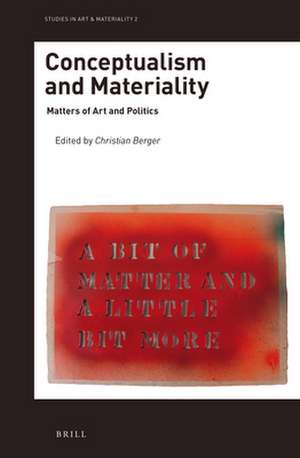Conceptualism and Materiality: Matters of Art and Politics: Studies in Art & Materiality, cartea 2
Editat de Christian Bergeren Limba Engleză Hardback – 28 aug 2019
The essays focus on the importance of material considerations for artists working during the 1960s and 1970s in different parts of the world. In reconsidering conceptualism’s neglected material aspects, the authors reveal the rich range of artistic inquiries into theoretical and political notions of matter and material. Their studies revise and diversify the account of this important chapter in the history of twentieth-century art — a reassessment that carries wider implications for the study of art and materiality in general.
Preț: 470.74 lei
Preț vechi: 632.98 lei
-26% Nou
Puncte Express: 706
Preț estimativ în valută:
90.08€ • 92.93$ • 75.17£
90.08€ • 92.93$ • 75.17£
Carte indisponibilă temporar
Doresc să fiu notificat când acest titlu va fi disponibil:
Se trimite...
Preluare comenzi: 021 569.72.76
Specificații
ISBN-13: 9789004372832
ISBN-10: 9004372830
Pagini: 326
Dimensiuni: 155 x 235 x 23 mm
Greutate: 0.86 kg
Editura: Brill
Colecția Brill
Seria Studies in Art & Materiality
ISBN-10: 9004372830
Pagini: 326
Dimensiuni: 155 x 235 x 23 mm
Greutate: 0.86 kg
Editura: Brill
Colecția Brill
Seria Studies in Art & Materiality
Notă biografică
Christian Berger, Ph.D. (2013), Freie Universität Berlin, is a lecturer at Johannes Gutenberg-Universität Mainz and currently a Marie Skłodowska Curie Fellow at The Courtauld Institute of Art in London. His scholarship focuses on conceptualism and on artistic materials and techniques.
Recenzii
"Berger’s edited volume of eleven chapters is a welcome addition to the literature on conceptual art and one that begins a necessary dialogue between this and materialist methodologies. […] [It] challenge[s] certain easy equations between conceptualism and idealism, or between conceptualism and a focus on ‘dematerialized’ language. [It] will also challenge those who see a ‘return to objects’ as necessarily materialist.“
John Thompson, Art History 45, no. 1 (February 2022)
"The relationship between art and material is of great relevance—not only under the impression of the digital. […] A tense relationship to the material (first and foremost in the sense of the material of a work) is generally attributed to Conceptual Art, whereby the emphasis on the (artistic) idea—a topos—is understood as a criticism of materiality. The debate here has been and continues to be about whether material is a prerequisite for art and its transformation an original task of artists. The rich, challenging and insightful conference volume Conceptualism and Materiality. Matters of Art and Politics is dedicated to this topic."
Michael Rottmann, Hochschule für Gestaltung und Kunst FHNW Basel in Texte zur Kunst
"A solid repertoire of subtle strategies of analysis, brilliant ideas and bibliographical paths, this volume is a valuable point of departure for further studies in materiality and it contributes to look at Conceptualism through new lenses.“
Filippo Bosco, in sehepunkte
John Thompson, Art History 45, no. 1 (February 2022)
"The relationship between art and material is of great relevance—not only under the impression of the digital. […] A tense relationship to the material (first and foremost in the sense of the material of a work) is generally attributed to Conceptual Art, whereby the emphasis on the (artistic) idea—a topos—is understood as a criticism of materiality. The debate here has been and continues to be about whether material is a prerequisite for art and its transformation an original task of artists. The rich, challenging and insightful conference volume Conceptualism and Materiality. Matters of Art and Politics is dedicated to this topic."
Michael Rottmann, Hochschule für Gestaltung und Kunst FHNW Basel in Texte zur Kunst
"A solid repertoire of subtle strategies of analysis, brilliant ideas and bibliographical paths, this volume is a valuable point of departure for further studies in materiality and it contributes to look at Conceptualism through new lenses.“
Filippo Bosco, in sehepunkte





